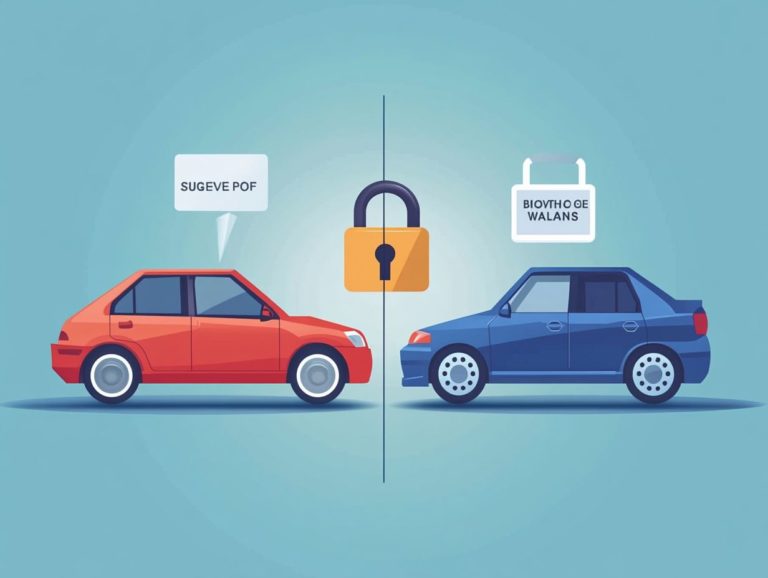Narrowing Down Your Auto Financing Choices
Navigating the world of auto financing can be quite overwhelming. With a multitude of options available at your fingertips, understanding the various types of financing whether it s a loan or a lease is crucial for making a well-informed decision.
Let s explore the key factors you need to consider, such as your credit score and the influence of interest rates. This article examines the pros and cons of different financing options, guiding you through the decision-making process while providing valuable tips for negotiating the best deal.
Dive in now to discover how to secure the perfect financing for your needs and budget!
Contents
Key Takeaways:

- Consider your credit score and financial situation when choosing auto financing to ensure you get the best rates and terms.
- Research and compare different types of auto financing options to find the one that best fits your needs and budget.
- Negotiate and finalize the deal with the lender or dealership to secure the best possible terms for your auto financing.
Understanding Auto Financing Options
Understanding auto financing options is essential for anyone considering the purchase of a vehicle. Whether you’re in the midst of car shopping or evaluating different financing avenues, grasping the details of auto loans, interest rates, and terms can profoundly influence your monthly payments and overall financial decisions.
With a variety of lenders at your disposal, including credit unions and online institutions, it’s crucial to carefully look at loan quotes and navigate the approval process with care. Always keep your credit score in mind, as it plays a pivotal role in securing the most favorable terms available to you.
Types of Auto Financing
There are several types of auto financing available, each tailored to meet your unique financial needs and preferences.
You can choose from dealership financing, where the dealer handles the loan process, or online lenders that offer competitive rates. Credit unions often provide customized auto loans with attractive interest rates. Getting pre-approval means receiving an agreement from a lender about how much money they will lend you before you start shopping for a car. This can streamline your car-buying experience by giving you a clearer picture of your budget and potential monthly payments.
Understanding the nuances of each financing option can significantly enhance your overall car-buying journey. While dealership financing offers convenience, it often comes with higher interest rates and limited choices. Credit unions typically prioritize member benefits, providing a more personalized experience with generally lower rates though you may need to be a member to enjoy those perks.
If you’re seeking quick comparisons and transparency, online lenders can be a great choice. However, the impersonal nature of these services might make it challenging to negotiate terms effectively.
Ultimately, securing pre-approval is a powerful strategy. It allows you to approach dealerships with confidence and negotiate from a well-informed position.
Factors to Consider Before Choosing Auto Financing

Before selecting an auto financing option, it s essential to weigh several factors that could influence your overall vehicle purchasing experience.
Your credit score is a key player here. It significantly affects the interest rates and loan terms you may qualify for, which impacts your monthly payment.
Understand your financial situation clearly, such as your capacity for a down payment and how to manage loan funding. This will empower you to make informed decisions that truly align with your desires and requirements.
Credit Score and Financial Situation
Your credit score and financial situation play a crucial role in determining the best auto financing options available to you. Lenders will review your credit history to assess risk, which can significantly influence both the approval process and the terms of the loan you receive.
By understanding your financial standing, you have the power to negotiate effectively and secure favorable terms that align with your needs.
A credit score typically ranges from 300 to 850, with scores above 700 generally seen as good for auto loans. The key factors influencing your score include:
- Payment history
- Outstanding debt
- Length of credit history
- New credit inquiries
- Types of credit in use
If you’re looking for financing, understanding your financial situation is critical. Don t miss out on the best rates available! It’s essential to recognize how your income levels and existing debt obligations can affect your ability to secure favorable rates. High debt-to-income ratios, which measure how much debt you have compared to your income, or inconsistent income may complicate the financing process, resulting in stricter terms or even potential denial of credit.
Interest Rates and Loan Terms
Interest rates and loan terms are essential elements of any auto loan, greatly influencing your monthly payments and overall financial commitment. By understanding how your credit score and the duration of the loan term impact interest rates, you can make informed decisions and steer clear of common pitfalls in the auto financing journey.
Gathering loan quotes from various lenders will give you valuable insights into what to expect. These rates are shaped by a range of factors, including the current economic climate, inflation, and the Federal Reserve’s policies.
Lenders consider the loan length; shorter terms usually mean lower interest rates but higher monthly payments, while longer terms can spread out costs, leading to a larger total amount paid over time. A robust credit history often translates to more favorable lending terms.
By grasping these dynamics, you can navigate your options with confidence, ensuring you select a loan that aligns with your financial needs and long-term goals.
Comparing Auto Financing Options

Comparing the options for auto financing is crucial for making an informed decision that fits your budget and preferences.
Each option whether financing through dealerships, credit unions, or online lenders has its unique advantages and disadvantages that can significantly influence your vehicle purchasing experience.
By carefully evaluating loan quotes, interest rates, and terms, you can select the financing option that aligns perfectly with your financial situation and goals.
Pros and Cons of Different Types
Each type of auto financing presents its unique set of pros and cons that can significantly shape your vehicle purchase experience. Take dealership financing, for instance; it may offer the allure of convenience and swift approvals, but it often comes with the downside of higher interest rates.
On the other hand, online lenders often offer competitive rates, yet they might lack that personal touch you often crave in customer service. Understanding these trade-offs is essential for making the most informed financing choice.
Credit unions often strike a favorable balance by providing lower interest rates alongside a more personalized approach. However, they usually require membership and may have limited availability, which can be a consideration for many.
While dealership financing might seem more straightforward at first glance, it can also lead to upselling pressure, potentially increasing your loan amount. Conversely, online lenders offer flexibility in tailoring loan terms but may involve lengthy documentation processes that could disrupt a quick purchase.
Carefully consider these variables, as they can significantly impact not just the total cost of the loan, but also your overall satisfaction and ease during your buying journey.
Steps to Narrow Down Your Choices
Narrowing down your choices in auto financing demands a methodical approach to evaluating your needs, budget, and the understanding of different car financing options available to you.
By gaining a clear understanding of your budget and the features you desire in a vehicle while also factoring in your trade-in value you can streamline the financing process. This not only helps you make informed decisions but also ensures that your choices align seamlessly with your desires and financial goals.
Take the first step today! Evaluate your budget and start comparing your financing options.
Assessing Your Needs and Budget

Assessing your needs and budget is a crucial first step in the auto financing journey. By understanding exactly what you want in a vehicle whether it’s essential features or size preferences you’ll streamline your car shopping experience and establish a realistic budget that aligns with your financial situation.
Start by evaluating the size of the vehicle that best suits your lifestyle. If you have a family, you might lean toward spacious SUVs or minivans. Individuals may prefer the nimbleness of compact cars that navigate urban environments easily.
Next, think about the features that matter most to you, such as safety ratings, fuel efficiency, and the latest technology.
Once you clarify your preferences, set a budget that includes the purchase price and other costs, such as financing options. Remember that interest rates can greatly influence your monthly payments. Don t forget ongoing expenses like maintenance and fuel costs, as these will shape your overall financial commitment.
Researching Lenders and Dealerships
Finding the right lenders and dealerships is exciting and essential! By examining lender reviews and comparing auto loan rates, you can make informed choices that elevate your entire car-buying experience.
Start by gathering information on various lenders, including traditional banks, credit unions, and online platforms that may offer competitive rates. Customer feedback and testimonials provide valuable insights into each lender s service and reliability.
By evaluating interest rates across different lenders, you can pinpoint the best terms available.
Once you have your shortlist, take a closer look at the specifics of each financing option. Consider factors like loan duration, which refers to how long you ll take to repay the loan, and prepayment penalties, which are fees for paying off your loan early. Understanding the application process is just as important. Being well-prepared with necessary documents can significantly streamline your journey to securing financing.
Making the Final Decision
Making the final decision in the auto financing process requires careful negotiation and a solid grasp of the terms presented to you.
Finalize the deal with sharp focus to ensure you get the best deal now. By paying close attention to loan quotes and your budget, you can ensure your monthly payments fit comfortably within your financial landscape, transforming your vehicle purchase into a rewarding experience.
Negotiating and Finalizing the Deal
Negotiating and finalizing the deal is the highlight of your auto financing journey. Effective communication can lead to better loan terms and a satisfying vehicle purchase.
Understanding your trade-in value and defining your financial limits empowers you during negotiations. Knowledge of current market rates and comparable vehicle prices strengthens your negotiating strength.
When interacting with lenders or dealerships, ask questions. Clarity on interest rates, loan duration, and fees helps you uncover hidden costs.
Be prepared to walk away if the terms don t fit your financial goals. This strategy reinforces your position and signals that your financial well-being is a priority.
This proactive approach can lead to a deal that meets your needs and secures the car you’ve dreamed of.
Frequently Asked Questions
How do I start narrowing down my auto financing choices?
First, determine your budget and how much you can spend. This helps you focus on vehicles within your price range.
Should I research different types of auto loans?
Yes, researching various auto loans is crucial. This includes traditional bank loans, dealership financing, and online lenders.
What factors should I consider when narrowing down my choices?
Key factors include interest rates, loan terms, monthly payments, and any extra fees. Also, check the lender’s reliability and customer service.
Is it better to have a larger down payment or a longer loan term?
A larger down payment is usually better. It can secure a lower interest rate and reduce your loan cost, but evaluate the impact of a longer term if needed.
Can I negotiate the terms of my auto financing?
Yes, negotiating terms like interest rates and payment schedules is possible. Come prepared with research on other lenders rates.
How do I know which auto financing option is right for me?
The best option depends on your financial situation. Consider all factors and consult a financial advisor or trusted individuals.






